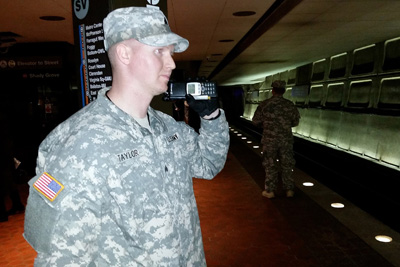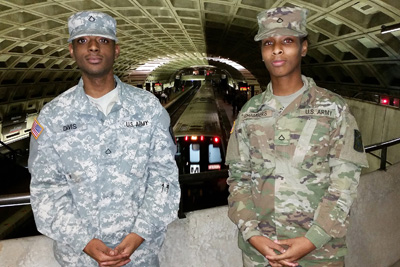By C. Todd Lopez
WASHINGTON (Jan. 23, 2017) -- On inauguration day, there were reports of trouble on the streets of the nation's capital, but down below, in the city's subway system, the situation remained relatively calm, according to Army Sgt. William S. Taylor.
A military police officer with the 268th Military Police Company out of Ripley, Tennessee, Taylor was one of the many Tennessee National Guard Soldiers invited to the nation's capital to provide support during the inauguration of the 45th president. In all, about 7,500 Guard troops provided security.

That Friday night, after the inauguration was over and the parade had ended, Taylor was standing guard as a team leader on the lower platform of the Metro Center station of the Washington, D.C. subway system.
"We're tasked, along with civilian law enforcement, to handle anything that may arise," he said. "We're [here] to make sure that everybody is safe traveling though this particular station, getting on and off the trains. And if there is any kind of incident, civilian authorities are the ones to take care of it."
Taylor led a team of four National Guard Soldiers who were all on the lower platform in the station, where supporters and protestors of the new president mingled. Some metro passengers carried signs from the protests they had attended, while others wore hats indicating support of the new administration.
But by evening, Taylor said, he hadn't seen any conflict among passengers.
"For the most part, it's been very, very peaceful. It's been crowded," he said. "People are just trying to get where they are supposed to go. Even people ... like protestors, they are all trying to get to the same place. Nobody's been upset with each other."
Taylor is a police officer in the Tennessee National Guard. He has served in the Army for eight years now.
In his civilian job, he serves as a police officer with the Metro Nashville Police Department. For inauguration day, however, he was deputized as part of his duties in the subway system by the Washington D.C. police department.
"Normally I'm a Nashville police officer," he said. "But today, I'm a special member of the D.C. Metro police." He wore an identification badge on his uniform indicating as much.
He said the opportunity to visit Washington, D.C. to participate in the inauguration was a privilege, but one that demanded a high level of responsibility.

"They're not going to pick anybody to come here," he said. "They pick people with integrity and pride. And they pick Soldiers that are going to be able to have respectability. ... It's not just looking the part, you have to act the part as well."
On the upper platform of the Metro Center station were Pfc. Kevie C. Davis and Pfc. Destinee M. Chambers. Both serve as supply specialists in the Tennessee National Guard.
"It's something I never done before, and it's stepping out of my comfort zone," Chambers admitted. "They told us we'd be doing crowd control and guarding the subways and making sure everything was safe for the people. I like trying new things."
While working in the subway, Chambers said, passengers repeatedly stopped to thank her for her service.
"They say, 'Keep doing what you're doing and thank you,'" she said. "That's what they told us."
Chambers has served in the Army only a short time now. She has been in uniform for less than two years and joined the Army so she could take advantage of the educational benefits. She plans to study criminal justice. But she expressed pride in wearing the uniform.
"I feel like I'm helping my country out a lot," she said.
Davis has been in the Army for three years. As a civilian, he is studying information systems at the University of Memphis. He and his fellow Guardsmen had been in the city for just a few days prior to the inauguration.
"We had fun, we enjoyed our time here," he said. "We had good training, and our superiors made sure we were well taken care of."